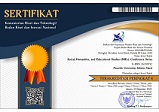Analisis Kebutuhan Pembelajaran Berdiferensiasi untuk Mengoptimalkan Literasi Sains di Sekolah Dasar
Abstract
Science literacy is a very important competency for 21st century students, especially in the lower grades of elementary school. However, learning that is still uniform often ignores the diversity in learning readiness, learning interests and learning styles of students, therefore the development of science literacy is less than optimal. This study aims to analyze the needs of differentiated learning to optimize the science literacy of grade II elementary school students. This study uses a qualitative descriptive approach with in-depth interview techniques with one teacher and 14 students, as well as documentation of classroom learning in one elementary school in Kebumen Regency. The results of the study showed that students have diversity in reading readiness, learning preferences and how to express understanding. Teachers are aware of the importance of differentiated learning, but face challenges in terms of time constraints, resources and classical learning culture. Students show that scientific attitudes can develop when learning is contextual. Therefore, analyzing the needs of differentiated learning is a very important first step in designing learning strategies that are responsive to student characteristics. This study provides an empirical basis for more adaptive science learning planning in lower elementary school grades and can be a reference for the initial stage in developing a responsive learning model based on the diversity of student needs.
Literasi sains merupakan kompetensi yang sangat penting bagi murid abad ke-21, terutama di kelas rendah sekolah dasar. Namun, pembelajaran yang masih sifat seragam seringkali mengabaikan adanya keberagaman dalam kesiapan belajar, minat belajar dan gaya belajar siswa, oleh karena itu kurang optimalnya perkembangan literasi sains. Penelitian ini bertujuan untuk menganalisis kebutuhan pembelajaran berdiferensiasi untuk mengoptimalkan literasi sains murid kelas II SD. Penelitian ini menggunakan pendekatan deskriptif kualitatif dengan teknik wawancara secara mendalam kepada satu guru dan 14 siswa, serta adanya dokumentasi pembelajaran dikelas di salah satu SD di Kabupaten Kebumen. Hasil penelitian menunjukkan bahwa siswa memiliki keberagaman dalam kesiapan membaca, prefrensi belajar dan cara mengungkapkan pemahaman. Guru menyadari pentingnya pembelajaran berdiferensiasi, namun menghadapi tantangan dalam keterbatasan waktu,sumber daya dan budaya belajar yang klasikal. Siswa menunjukan bahwa sikap ilmiah dapat berkembang ketika pembelajaran secara kontekstual. Oleh karena itu, analisis kebutuhan pembelajaran berdiferensiasi menjadi langkah pertama yang sangat penting untuk merancang strategi pembelajaran yang tanggap terhadap karakteristik siswa. Studi ini memberikan dasar empiris untuk perencanaan pembelajaran sains yang lebih adaptif dikelas rendah sekolah dasar dan dapat menjadi acuan tahap awal dalam penyusunan model pembelajaran yang responsive berbasis keberagaman kebutuhan siswa.
Keywords
Full Text:
PDFReferences
LATIFAH, D. N. (n.d.). ANALISIS GAYA BELAJAR SISWA UNTUK PEMBELAJARAN .Vol. 3 No. 1 Februari 2023, 68-75.
Siti Aminuriyah, A. I. (2023). A Case Study of Differentiated Instruction at Elementary Schoo. Vol 15, No 4 (2023) .
Yuen, S. Y., Luo, Z., & Wan, S. W. Y. (2023). Challenges and opportunities of implementing differentiated instruction amid the COVID-19 pandemic: Insights from a qualitative exploration. Education Sciences, 13(10), 989.
Şentürk, C., & Sari, H. (2018). Investigation of the contribution of differentiated instruction into science literacy. Qualitative Research in Education, 7(2), 197-237.
Taş, H., & Minaz, M. B. (2024). The Effects of Learning Style-Based Differentiated Instructional Activities on Academic Achievement and Learning Retention in the Social Studies Course. SAGE Open, 14(2), 21582440241249290.
Tomlinson, C. A., & Imbeau, M. B. (2023). Leading and managing a differentiated classroom. Ascd.
Aminuriyah, S., Al Ma'ruf, A. I., Destya, A., & Minsih, M. (2023). A Case Study of Differentiated Instruction at Elementary School. Al-Ishlah: Jurnal Pendidikan, 15(4), 6227-6240.
Yunani, N., Mustadi, A., Mumpuniarti, M., Ishartiwi, I., & Hidayat, R. (2024). Differentiated instruction science learning for intellectually disabilities pupils at an inclusive primary school: A case study. Journal of Turkish Science Education, 21(3), 467-483.
Syofyan, H., Fadli, M. R., Lestari, M. R. D. W., & Rosyid, A. (2025). Optimizing science learning through differentiated models to improve science literacy in the digital era. Multidisciplinary Reviews, 8(6), 2025182-2025182.
Lenzer, S., Pannullo, L., Nehring, A., & Stinken-Roesner, L. (2024). Towards Scientific Literacy in Inclusive Science Education. arXiv preprint arXiv:2411.03020.
Suryandari, K., Budi, S., & Kun, Z. (2017, October). Effectiveness of Project Based Learning on Empowerment Critical Thinking Skill toward Preservice Teacher on Primary Teacher Education Program. In International Conference on Teacher Training and Education 2017 (ICTTE 2017) (pp. 505-513). Atlantis Press.
Chrysti, K. S., Rokhmaniyah, & Chamdani, M. (2020, September). Enhancement of Artifact Based Activities Learning in Natural Science Through Scientific Reading Based Project (SRBP) Model for Preservice Teacher Using Design Based Research (DBR). In Proceedings of the 4th International Conference on Learning Innovation and Quality Education (pp. 1-5).
Suryandari, K. C., Rahardjo, S. B., & Prasetyo, Z. K. (2017). The Beliefs towards Science Teaching Orientation of Pre-service Teachers in Primary Teacher Education Programme. Pertanika Journal of Social Sciences & Humanities.Young, R.F. (2007). Crossing Boundaries in Urban Ecology (Doctoral Dissertation). Tersedia dari Proquest Dissertation & Theses Database.
Kementrian Pendidikan dan Kebudayaan RI. (2011). Peraturan Mendiknas tentang Satuan Pengawasan Internal (Permendiknas Nomor 47 tahun 2011). Jakarta: Penulis.
Refbacks
- There are currently no refbacks.





